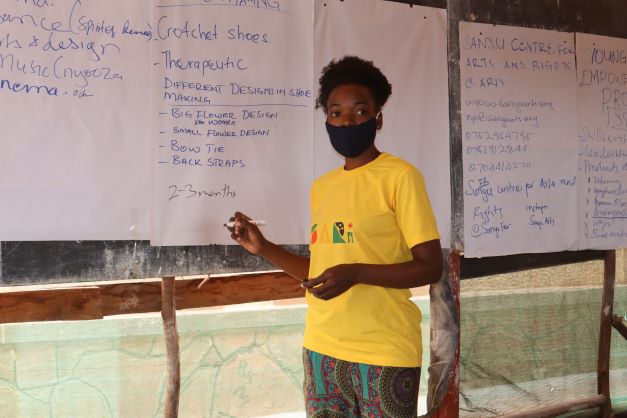"A leader is best taught by a leader." Ugandan proverb.

© SARI Uganda, 2021
Young leader facilitating a peer session in enterprise development
Everyone is a leader. Everyone can influence and contribute to positive social change. Everyone has an ability to add value to one's community and society. It takes a leader to identify and develop a leader. Sadly, not everyone gets to understand that one has what it takes to contribute to a desired society. A major contributor to this are the mindsets and attitudes driven by gender stereotypes, location, limitation in knowledge and the unwillingness to push beyond the known or the normal.
© SARI Uganda, 2021
Young leader facilitating a training session.
At Sanyu Centre for Arts and Rights, creating a growth environment for young people especially girls and young women to develop in their different leadership abilities to influence their communities is our priority. Our goal is strong grassroots youth movements participating in civic spaces through artivism. Our aim is young community women leaders having increased knowledge and skills in leadership and community engagements as well as inclusive youth networks and new partnerships established with civil society, media and grassroots structures to actively participate in civic spaces. SARI provides participants with a foundational understanding of various gender related socio economic issues such as youth unemployment, Sexual and Reproductive Health Rights, Sexual and Economic Gender based violence with a gender and human rights lens. Participants are then be guided through thinking processes in leadership, evidence gathering and advocacy using artivism to help them influence social change.
© SARI Uganda, 2021
Young woman leading a discussion during a leadership session
There is need for youth across all gender and status to be actively engaged in leadership and decision making yet with the closing in space for civil society, this has been greatly undermined. Youth especially girls and young women, youth with disabilities, youth in the informal sector have limited opportunities to engage in community leadership, decision making as well as social accountability platforms for social service delivery.
SARI uses artivism for young leaders to address gender, economic and civic issues that society may be silent about. Young launch periodic advocacy campaigns of common emerging issues which are presented through artivism inform of audio dramas, picture messages, radio dialogues, writing, poetry, dance and other forms of expressions. SARI also uses media, social media and community platforms for communication and engagements

© SARI Uganda, 2021
Young woman using story board for story telling
At SARI, everyone has equal opportunity to positively influence one's community. We are leaders who identify and develop leaders for active civic engagement.
We keep striding forward bringing many with us to this cause of a global movement of young people creating positive social change through ARTs!












